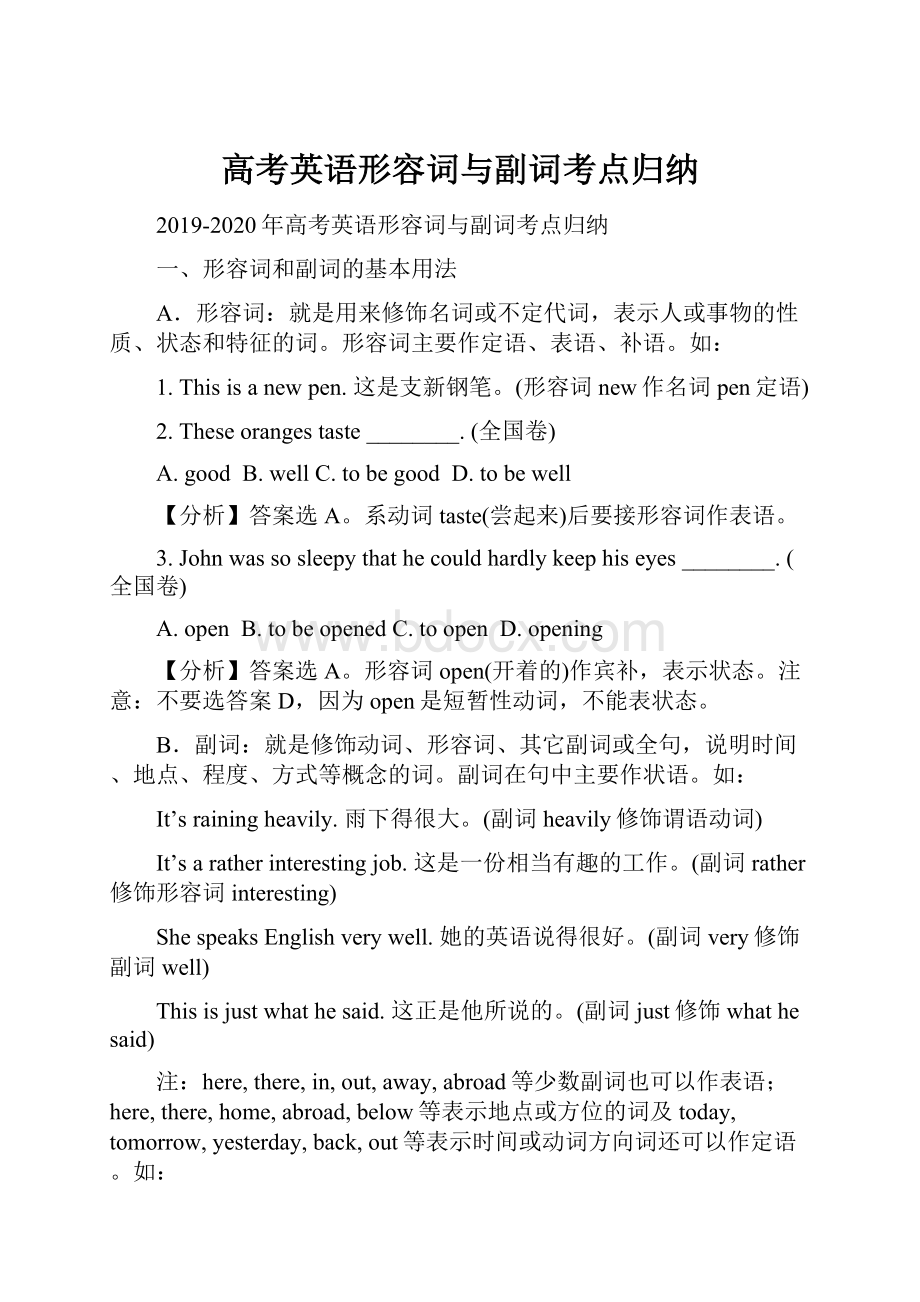高考英语形容词与副词考点归纳.docx
《高考英语形容词与副词考点归纳.docx》由会员分享,可在线阅读,更多相关《高考英语形容词与副词考点归纳.docx(17页珍藏版)》请在冰豆网上搜索。

高考英语形容词与副词考点归纳
2019-2020年高考英语形容词与副词考点归纳
一、形容词和副词的基本用法
A.形容词:
就是用来修饰名词或不定代词,表示人或事物的性质、状态和特征的词。
形容词主要作定语、表语、补语。
如:
1.Thisisanewpen.这是支新钢笔。
(形容词new作名词pen定语)
2.Theseorangestaste________.(全国卷)
A.goodB.wellC.tobegoodD.tobewell
【分析】答案选A。
系动词taste(尝起来)后要接形容词作表语。
3.Johnwassosleepythathecouldhardlykeephiseyes________.(全国卷)
A.openB.tobeopenedC.toopenD.opening
【分析】答案选A。
形容词open(开着的)作宾补,表示状态。
注意:
不要选答案D,因为open是短暂性动词,不能表状态。
B.副词:
就是修饰动词、形容词、其它副词或全句,说明时间、地点、程度、方式等概念的词。
副词在句中主要作状语。
如:
It’srainingheavily.雨下得很大。
(副词heavily修饰谓语动词)
It’saratherinterestingjob.这是一份相当有趣的工作。
(副词rather修饰形容词interesting)
ShespeaksEnglishverywell.她的英语说得很好。
(副词very修饰副词well)
Thisisjustwhathesaid.这正是他所说的。
(副词just修饰whathesaid)
注:
here,there,in,out,away,abroad等少数副词也可以作表语;here,there,home,abroad,below等表示地点或方位的词及today,tomorrow,yesterday,back,out等表示时间或动词方向词还可以作定语。
如:
Tomisn’there.汤姆不在这里。
(here作表语)
Thepeopletherewereverykindtous.那里的人对我们很友好。
(副词there作定语,修饰people)
二、定语形容词与表语形容词
A.表语形容词:
有的形容词一般只作表语,如表示健康状况的well,unwell,ill,faint,表示情感反应的glad,sorry,fond,worth,able,以a开头的afraid,alone,asleep,alive,awake,alike,ashamed等。
但有的可作后置定语或补语。
B.定语形容词:
通常只作定语的形容词,如起强调作用的only(唯一的),single(唯一的),certain(某一),real(真正的),true(真正的),very(正是),live(活的),exact(准确的),present(在场的),由名词等转化而来的wooden(木制的),woolen(羊毛制的),drunken(醉的),medical,daily,weekly,electric,former(前任的),some,any,little,many,及one-eyed之类的复合形容词等。
如:
Thisisamedicalschool.(不说Thisschoolismedical.)
三、形容词作定语的后置规律
形容词作定语一般位于所修饰的名词前,但是在下列情况下作定语的形容词却要位于所修饰的名词之后:
A.形容词短语作定语时要后置。
如:
________totakethisadventurecoursewillcertainlylearnalotofusefulskills.(全国卷)
A.BraveenoughstudentsB.Enoughbravestudents
C.StudentsbraveenoughD.Studentsenoughbrave
【分析】答案选C。
enough修饰形容词时要位于形容词之后,排除B和D。
braveenoughto…是形容词短语作定语,修饰students,要置于名词students之后。
B.表语形容词作定语要后置。
如:
Allthepeople________atthepartywerehissupporters.(北京卷)
A.presentB.thankfulC.interestedD.important
【分析】答案选A。
表语形容词present(出席的、在场的)作定语,要放在所修饰的名词后。
C.形容词修饰不定代词something,anything,nothing等时,要位于后面。
如:
Isthereanythingimportantinthepaper?
报纸上有什么重要新闻吗?
四、多个形容词作定语的排序
多个形容词修饰名词时,其排序规律是:
(限定词+程度副词+)描绘性形容词+表示大小(长短、高低)、形状、年龄(新旧)的形容词+表颜色的形容词+表国籍或产地的形容词+表物质材料的形容词+表类别或用途的形容词+名词。
如:
1.JohnSmith,asuccessfulbusinessman,hasa________car.(辽宁卷)
A.largeGermanwhiteB.largewhiteGermanC.whitelargeGermanD.Germanlargewhite
【分析】答案选B。
按“大小+颜色+产地”的顺序排列。
2.________studentsarerequiredtotakepartintheboatrace.(浙江卷)
A.TenstrongyoungChinese B.TenChinesestrongyoung
C.Chinesetenyoungstrong D.YoungstrongtenChinese
【分析】答案选A。
数词是限定词,应排在形容词前,排除C和D;又strong是描绘,young是年龄,Chinese是国籍,其先后应为“描绘+年龄+国籍”。
3.The________housesmellsasifithasn’tbeenlivedinforyears.(江苏卷)
A.littlewhitewoodenB.littlewoodenwhiteC.whitewoodenlittleD.woodenwhitelittle
【分析】答案选A。
little是限定词,应放在形容词前面,排除C和D;表示颜色的应放在表示物质材料的形容词的前面,排除B。
注:
限定词的排序:
前位限定词(指量限定词all,both,half等;倍数词double,twice等;分数词one-third,two-fifths等)+中位限定词(冠词;指示代词;形容词性物主代词;名词所有格)+后位限定词(序数词及last,next等;基数词及few,several等)。
如:
1.Thehusbandgavehiswife________everymonthinordertopleaseher.(重庆卷)
A.allhalfhisineB.hishalfallineC.halfhisallineD.allhishalfine
【分析】答案选A。
all和half都是前位限定词,his是中位限定词,所以his要位于all和half之后,只有A正确。
2.—HowwasyourrecentvisittoQingdao?
—Itwasgreat.Wevisitedsomefriends,andspentthe________daysattheseaside.(全国卷)
A.fewlastsunnyB.lastfewsunnyC.lastsunnyfew D.fewsunnylast
【分析】答案选B。
last,few是限定词,sunny是描绘性形容词,根据“限定词+形容词”的原则,排除C和D。
又根据“序数词(包括last,past,next,another等)+基数词(包括few,several等)”的原则,排除A。
五、副词在句中的位置规律
1)副词修饰形容词或其它副词时,一般位于被修饰词的前面,但enough却要放在被修饰的形容词或副词的后面。
如:
1.—Mum,IthinkI’m________togetbacktoschool.
—Notreally,mydear.You’dbetterstayathomeforanotherdayortwo.(全国卷)
A.sowellB.sogoodC.wellenough D.goodenough
【分析】答案选C。
指“身体好”用形容词well(=healthy)而不用good;副词enough修饰形容词时,要位于形容词之后。
2.IfIhad________,I’dvisitEurope,stoppingatthesmallinterestingplaces.(全国卷)
A.alongenoughholiday B.anenoughlongholiday
C.aholidayenoughlong D.alongholidayenough
【分析】答案选A。
enough要放在形容词long之后。
3.________,somefamousscientistshavethequalitiesofbeingbothcarefulandcareless.(上海卷)
A.StrangelyenoughB.EnoughstrangelyC.StrangeenoughD.Enoughstrange
【分析】答案选A。
修饰整个句子,要用副词,排除C和D;副词enough应放在它所修饰的副词strangely的后面,所以选A。
2)频度副词always,usually,often,never等一般放在行为动词前,或者情态动词、助动词或be动词之后。
如:
Shealwaysgetsupearly.她总是起得早。
(副词always放在行为动词gets之前)
Sheisseldomlateforschool.他很少上学迟到。
(副词seldom放在be动词之后)
3)词表示地点的副词常放在句末;表示确定时间的副词放在句首或句末;表示方式的副词词通常放在“动词(+宾语)”之后,也可放在其它位置;同时有表示时间、地点和方式的副词时,其顺序一般为:
方式+地点+时间。
如:
________Iwenttotherailwaystationtoseemyfriendoff.(全国卷)
A.Aftereatingquicklymydinner B.Aftermyquicklyeatingdinner
C.Aftereatingmydinnerquickly D.Aftereatingmyquicklydinner
【分析】答案选C。
方式副词一般位于“动词(+宾语)”之后。
六、–ed形容词和-ing形容词的区别
-ed形容词,通常说明人,意为“(某人)感到…”;-ing形容词通常说明事物,意为“(某事物)令人…”或“令人…的(事物)”。
这样成对的形容词有:
interested/interesting;excited/exciting;frightened/frightening;surprised/surprising;pleased/pleasing;moved/moving;disappointed/disappointing等。
1.Lawsthatpunishparentsfortheirlittlechildren’sactionsagainstthelawsgetparents________.(重庆卷)
A.worriedB.toworriedC.worryingD.worry
【分析】答案选A。
表示人“感到忧虑的”用-ed形容词。
句意是:
…法律使得做父母的感到忧虑。
2.Itisbelievedthatifabookis________,itwillsurely________thereader.
A.interested;interestB.interesting;beinterested
C.interested;beinterestingD.interesting;interest
【分析】答案选D。
指书令人有趣用interesting而不interested,排除A和C。
interest是动词,“使…有趣”。
注:
即使-ed形容词用以说明事物,那也是指与该事物相关的人;即使-ing形容词用以说明人,也是指此人具有该性质或特征。
如:
Hetoldmethenewsinanexcitedvoice.他告诉了那个消息,声音很激动。
Themanisinteresting.这个有很有趣。
另外,glad,happy,sorry,angry,thankful,proud等的主语也只能是人;而pleasant,easy,difficult,important等则通常以事物或it作主语,因为它们是说明事物的。
如:
—I’mvery________withmyowncooking.Itlooksniceandsmellsdelicious.
—Mn,itdoeshavea________smell.(北京卷)
A.pleasant;pleasedB.pleased;pleasedC.pleasant;pleasantD.pleased;pleasant
【分析】答案选D。
pleased指“(人)感到高兴”,pleasant指“令人愉快的(事物)”。
2019-2020年高考英语总复习1-1Unit1Friendship新人教版
Ⅰ.单词拼写
1.Ittookalongtimeforhimto________(恢复)fromabadcold.
2.WhenIsawhiminthestreet,Istoppedandsmiled,buthe________(不理会)meandwalkedon.
3.Jameswas________(心烦的)becausehehadlosthisticket.
4.Mysonhas________(定居)happilyinAmerica.
5.Weare________(感激的)toyouforthehelpyouhavegivenus.
6.The________(整个的)populationwaswipedoutbytheterribledisease.
7.Theboy'spoorhealth________(使担忧)hisparents.
8.Thechildrenplayed________(在户外)untilitstartedtorain.
9.Sheseemstodothesethingson________(故意).
10.Doyouneedmetohelpyou________(打包行李)up?
答案:
1.recover 2.ignored 3.upset 4.settled 5.grateful
6.entire 7.concerned 8.outdoors 9.purpose 10.pack
Ⅱ.完成句子
1.________________________(使他不安)thatnobodyhadbotheredtotellhim.(upset)
2.Weareall________________________________(担心她的安全).(concern)
3.Wespentseveraldays________________(浏览)allrelatedmaterials.(go)
4.________________________________(当住在英国时),hepickedupsomeEnglish.(状语从句的省略形式)
5.ThiswasthethirdtimethatI________________________(记下)youraddress.(set)
6.________________(遭受)suchaheavyloss,thebusinessmandidn'thavethecouragetogoon.(suffer)
答案:
1.Itupsethim 2.concernedabouthersafety 3.goingthrough 4.When/WhilelivinginEngland 5.hadsetdown 6.Havingsuffered
Ⅲ.单项填空
1.Ihave________everythingthathappened,asIwanttorememberit.
A.setoff B.seton
C.setoutD.setdown
答案:
D 考查set短语辨析。
setdown“写下,记录”,与下文的“因为我想记住它”相对应。
句意:
我把所发生的一切都写了下来,因为我想记住它。
setoff“出发,启程”;seton“攻击”;setout“出发,开始”。
2.________intothecollege,hehadtoworkhardatallthesubjects,someofwhichhedidn'tlike.
A.InordertoadmitB.Inordertobeadmitted
C.SoastoadmitD.Soastobeadmitted
答案:
B 考查inorderto的用法。
inorderto与soasto都可以用来引导目的状语,但soasto一般不用于句首,因此排除C、D。
admit与he之间为动宾关系,故用不定式的被动语态,从而排除A。
3.Themanputdownthephonewithalongface,obviously________abouttheinformationhereceived.
A.contentB.amazed
C.happyD.upset
答案:
D 考查形容词辨析。
句意:
那个人拉着长脸放下电话,显然他对接到的消息很失望。
与withalongface照应,此处应用upset。
beupsetaboutsth.是固定搭配。
4.Thegirlonthebusbegantosingapopsongandsoonalltheothers________.
A.joinedB.joinedin
C.attendedD.tookpart
答案:
B 考查短语辨析。
join指加入某个党派、团体、组织等,成为其成员之一,意为“参军、入团、入党等”。
和某人一道做某事,其结构为joinsb.in(doing)sth.,根据上下文,in(doing)sth.也可以省去。
attend是正式用语,及物动词,指参加会议、婚礼、葬礼、典礼;上课、上学、听报告等。
句子的主语只是去听、去看,自己不一定起积极作用。
takepartin指参加会议或群众性活动等,着重说明句子主语参加该项活动并在活动中发挥作用。
5.—MyGod!
I'mgettinglateagain.Whatwillmybosssay?
—Trytokeep________;we'llthinkofanexcuse.
A.silentB.calm
C.stillD.quiet
答案:
B 考查形容词辨析。
句意:
——天哪!
我又要迟到了。
老板会说什么呢?
——尽量保持镇静,我们会想到一个借口的。
calm强调内心“沉着的;镇定的”。
6.Wouldyoupleasestopchatting?
It'stimewe________someseriouswork.
A.gotoverB.gotdownto
C.gotacrossD.gotalong
答案:
B 考查短语辨析。
句意:
请你停止闲谈好吗?
是该我们认真工作的时候了。
getdowntosth.表示“开始认真对待/考虑某事”。
getover“克服,从……中恢复过来”;getacross“越过,让人理解”;getalong“进展,相处”。
7.Intheeveningthecarbrokedownsuddenlyandtheheavyrain________thehelplessnessofthegirldriveronthecountryroad.
A.resultedinB.turnedout
C.addedtoD.setloose
答案:
C 句意:
在晚上车突然抛锚,大雨更增加了在乡村路上女司机的无助。
addto表示“增加,增添”。
resultin“结果,导致了”;turnout“结果是,证明是”;setloose“释放”,均不符合题意。
8.Heisamazinglycheerfulconsideringallthedifficultiesthathe's________.
A.goneoverB.goneout
C.goneagainstD.gonethrough
答案:
D 句意:
鉴于他经历过的种种困难,他的乐观豁达令人惊叹。
gothrough指“经历;忍受;遭受”,此处thathe'sgonethrough为定语从句。
9.They________witheachotherfortwoyearsbeforetheygotmarried.
A.hadfalleninloveB.gotinlove
C.hadbeeninloveD.fellinlove
答案:
C 句意:
在他们结婚之前他们已经相爱两年了。
falli